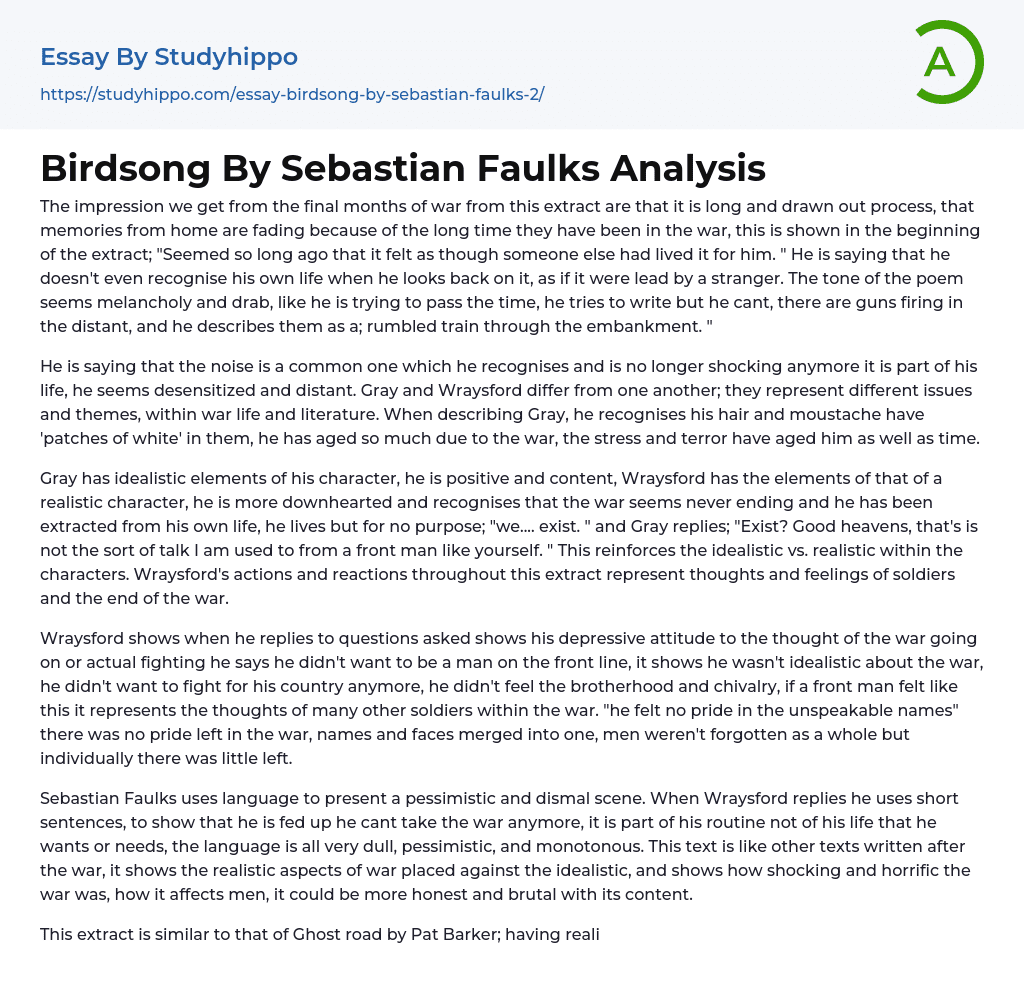The impression we get from the final months of war from this extract are that it is long and drawn out process, that memories from home are fading because of the long time they have been in the war, this is shown in the beginning of the extract; "Seemed so long ago that it felt as though someone else had lived it for him. " He is saying that he doesn't even recognise his own life when he looks back on it, as if it were lead by a stranger. The tone of the poem seems melancholy and drab, like he is trying to pass the time, he tries to write but he cant, there are guns firing in the distant, and he describes them as a; rumbled train through the embankment. "
He is saying that the noise is a common one which he recognises and is no
...longer shocking anymore it is part of his life, he seems desensitized and distant. Gray and Wraysford differ from one another; they represent different issues and themes, within war life and literature. When describing Gray, he recognises his hair and moustache have 'patches of white' in them, he has aged so much due to the war, the stress and terror have aged him as well as time.
Gray has idealistic elements of his character, he is positive and content, Wraysford has the elements of that of a realistic character, he is more downhearted and recognises that the war seems never ending and he has been extracted from his own life, he lives but for no purpose; "we.... exist. " and Gray replies; "Exist? Good heavens, that's is not
the sort of talk I am used to from a front man like yourself. " This reinforces the idealistic vs. realistic within the characters. Wraysford's actions and reactions throughout this extract represent thoughts and feelings of soldiers and the end of the war.
Wraysford shows when he replies to questions asked shows his depressive attitude to the thought of the war going on or actual fighting he says he didn't want to be a man on the front line, it shows he wasn't idealistic about the war, he didn't want to fight for his country anymore, he didn't feel the brotherhood and chivalry, if a front man felt like this it represents the thoughts of many other soldiers within the war. "he felt no pride in the unspeakable names" there was no pride left in the war, names and faces merged into one, men weren't forgotten as a whole but individually there was little left.
Sebastian Faulks uses language to present a pessimistic and dismal scene. When Wraysford replies he uses short sentences, to show that he is fed up he cant take the war anymore, it is part of his routine not of his life that he wants or needs, the language is all very dull, pessimistic, and monotonous. This text is like other texts written after the war, it shows the realistic aspects of war placed against the idealistic, and shows how shocking and horrific the war was, how it affects men, it could be more honest and brutal with its content.
This extract is similar to that of Ghost road by Pat Barker; having realistic elements from a soldiers point of view, shows the horror
of war, the desensitization and the difference in ranks. It also reminds the reader of 'Recalling War' by Robert Graves, because it was written after the war, the shock factor is a lot less, when you are living an event it is so much clearer and precise, these are memories that have dulled and less precise, making it half the piece it could be, it is less shocking.
- Book Summary essays
- Metaphor essays
- Reader essays
- Rhyme essays
- Literary devices essays
- Villain essays
- Books essays
- Genre essays
- Literary Criticism essays
- Writer essays
- Protagonist essays
- Simile essays
- Poem essays
- Book Report essays
- Book Review essays
- Greek Mythology essays
- Plot essays
- Tragic Hero essays
- Coming of Age essays
- Play essays
- Rhetoric essays
- Rhetorical Question essays
- Translation essays
- Understanding essays
- Reason essays
- Character essays
- Letter essays
- American Literature essays
- Literature Review essays
- Utopia essays
- Poetry Analysis essays
- Dante's Inferno essays
- Between The World and Me essays
- Incidents in The Life of a Slave Girl essays
- Flowers for Algernon essays
- Myth essays
- Everyday Use essays
- Boo Radley essays
- Genesis essays
- Richard iii essays
- Alice in Wonderland essays
- On the road essays
- Ozymandias essays
- The Nightingale essays
- Holden Caulfield essays
- Animal Farm essays
- 1984 essays
- A Hanging essays
- Shooting An Elephant essays
- A Tale Of Two Cities essays




